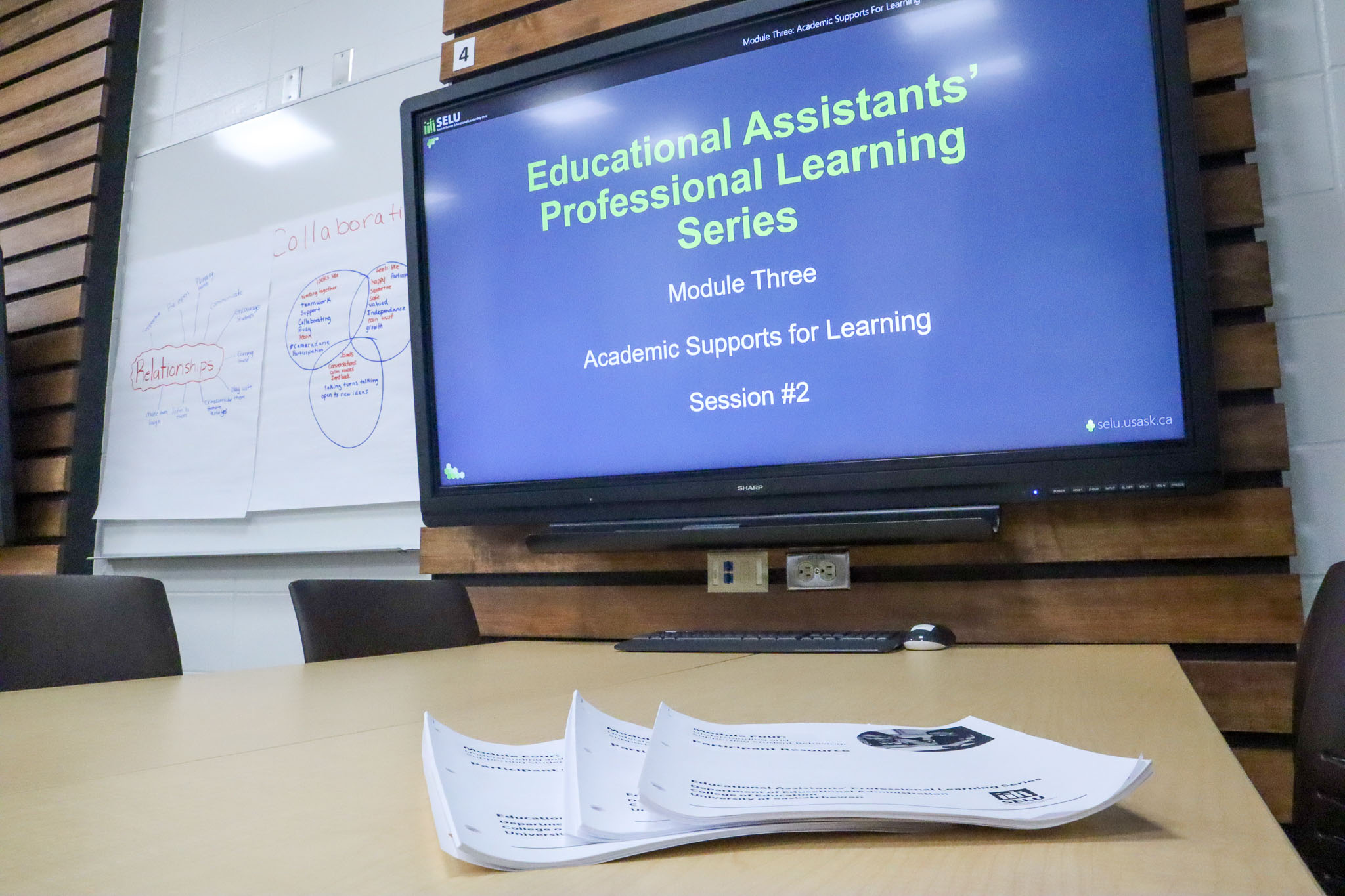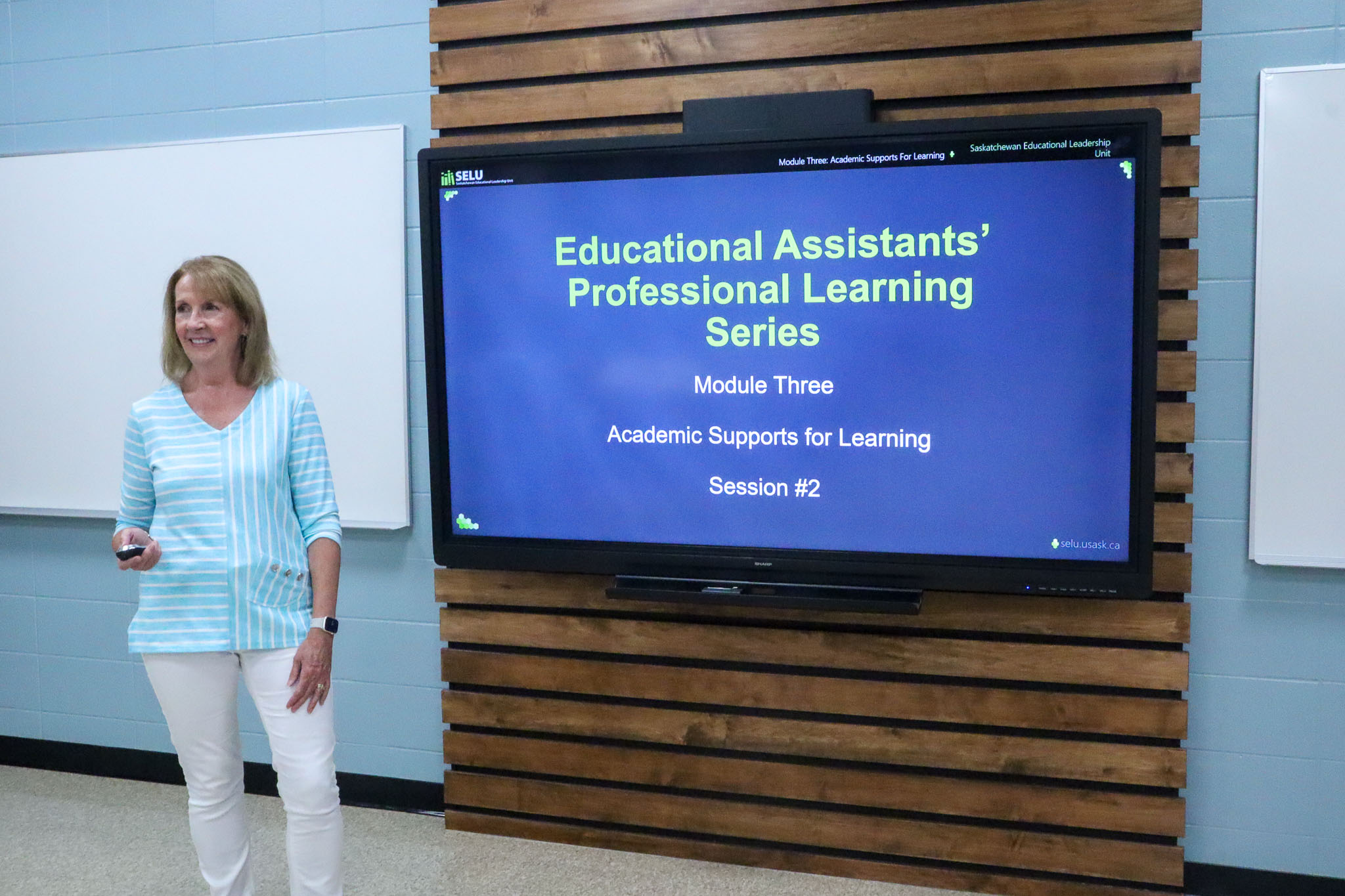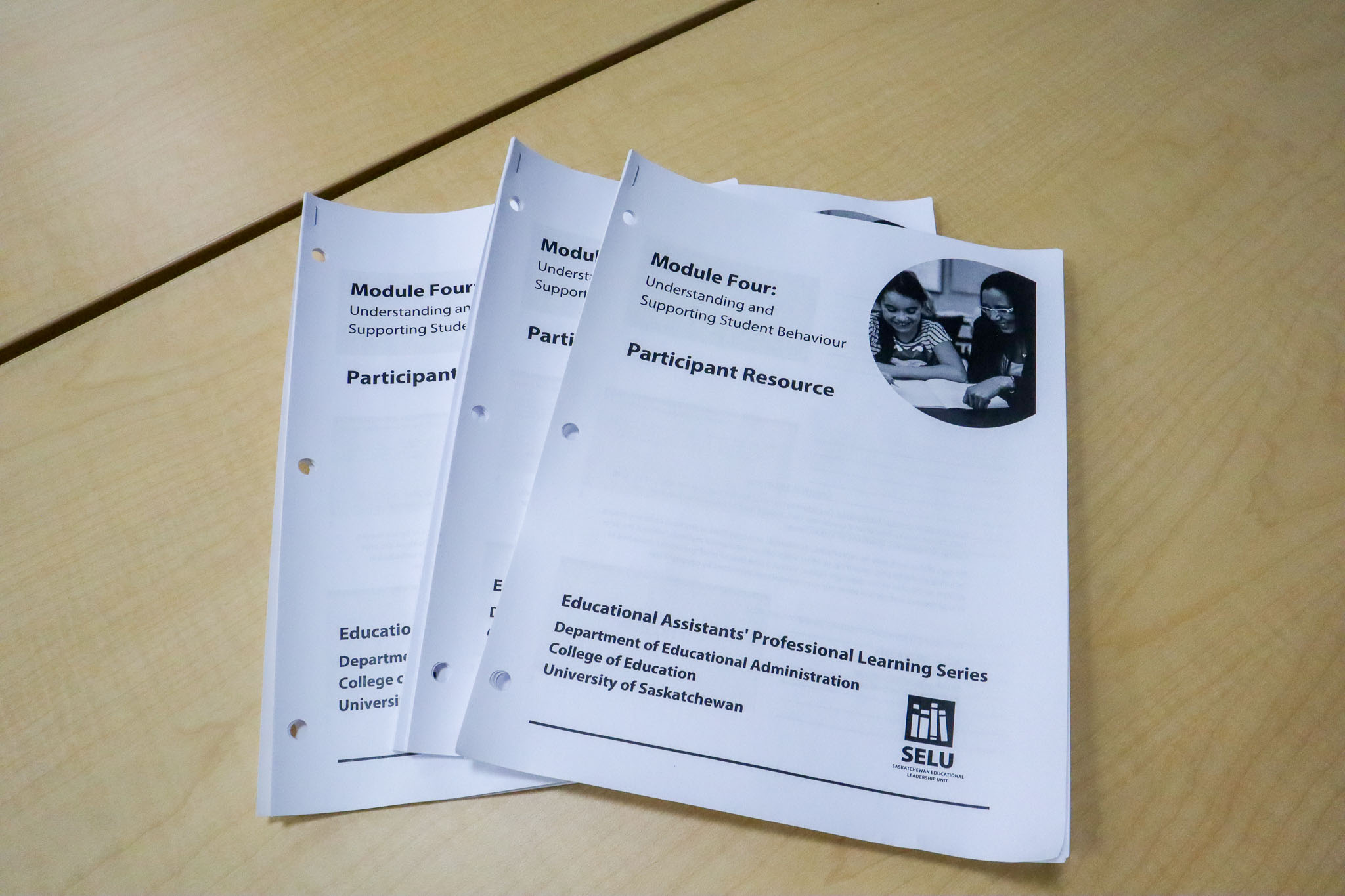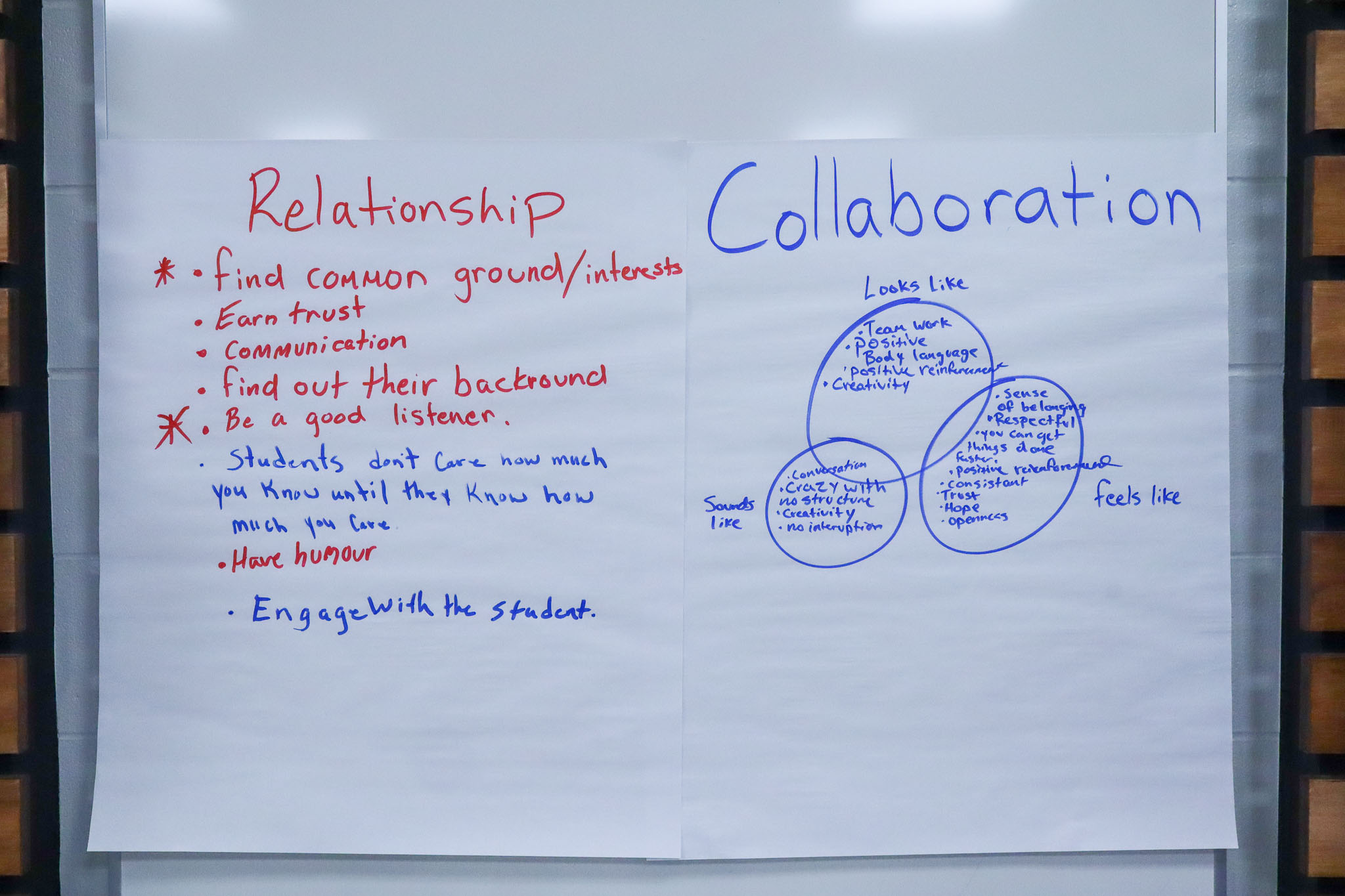
Celebrating over twenty years of EA professional learning development
How the changing classrooms of the early 21st century required the development of a training program to assist with the increase of educational assistants across school divisions.
By Connor JayIn the late 1990s, the Government of Saskatchewan’s Ministry of Education required the integration of students with physical and learning challenges into mainstream classrooms to learn alongside their peer group. As a response to the inclusionary approach, there was an influx of educational assistants hired across Saskatchewan to support classroom teachers.
The Saskatchewan Educational Leadership Unit (SELU) with the assistance of the College of Education and qualified professionals developed the Educational Assistants' Professional Learning Series (EAPLS), formerly known as the Educational Assistants’ Modules, to provide professional development and workshops to help educational assistants (EAs) in their role. The series was developed, written, piloted and implemented from 2002-2004.
“[At the time], there were over 100 school divisions in Saskatchewan,” said Brian Keegan, associate director of SELU from 2001-2009. “These tiny school divisions had little infrastructure to deal with the needs of students with disabilities. They didn't have the resources to have specialty positions to support the EAs who were coming into their school system.”
Keegan, who held an organizational role related to management and promotion of the program, outlined how the only formalized training for EAs at the time took place at Saskatchewan Polytechnic and was not a requirement for the position. As such, smaller, rural, and First Nations education authorities had less access to people that had taken educational assistant or early childhood education training and were familiar with the language, terms and acronyms used in special education.

The writers of the EA modules prioritized aligning the series with content from Saskatchewan Polytechnic and the Ministry of Education’s expectations, philosophy and terminology. The modules outlined the way teaching and learning happens, simplify terms and explain why instruction occurs a certain way.
Shannon Dobko, a Phd candidate in Educational Administration, was contracted to write the initial four modules. Her previous background was in special education as a school division consultant. Later, Dobko wrote two more modules on specific disabilities. One was on the Autistic Spectrum and the other related to Fetal Alcohol Syndrome. It became evident that these two areas were becoming an increasing need.
Linda Stanviloff, who was a module facilitator and later revised modules, used her background in special education to guide her teaching process.
“There were lots of changes happening in schools around an increasing number of students with diverse needs, more kids with special needs and behavioural challenges,” shared Stanviloff. “For school divisions and tribal councils, it was often challenging to try and find appropriate professional development (PD) for the EAs.”
The first module would cover collaboration and working alongside teachers and school administration. SELU would hire contractors, many of whom were specialists in the topic, from across the province to facilitate the modules in different locations during regularly-scheduled teacher and EA PD days. Several other modules were piloted with the initial sessions focusing on EAs in rural school divisions.
“Until you go out and present the modules, you don't know if you have enough content or activities,” said Louise Phaneuf, a member of the module writing team. “We made some adjustments, added some additional material and tweaked it after the pilot sessions.”
Phaneuf would join the EAPLS as a facilitator until 2019. She was shoulder-tapped by her master’s degree supervisor Dr. Brian Noonan since he knew she was looking for opportunities to research the role of paraprofessionals in supporting children with intellectual disabilities.
“My primary role with the EAPLS modules was in my work with Prince Albert Catholic School Division, where I was responsible for the students with intensive needs,” said Phaneuf. “We used the EAPLS modules as a professional development opportunity.”
The series was built from an adult learner perspective and a recognition that educational assistants have lots to offer students, teachers and the classroom. The sessions were built on the philosophy of collaborative teams. The interactive environment garnered the participants the opportunity to receive information, provide feedback on it and then engage in discussions with each other.
“Educational assistants have always been considered part of the supports for all students, but in particular for our students with intensive needs,” said Phaneuf. “In order to be a good support, they must have some training and knowledge. [By] having these modules align closer to what school divisions were actually doing, EAs became a more valuable resource in the classroom.”

Once SELU was confident in the modules, they knew the delivery model was the next stage to refine. The chosen facilitators were experienced educators who typically worked in special education in their school divisions. When they facilitated the sessions, they found that the educational assistants were quite responsive and wanted to implement the ideas they were learning. Positive feedback started to spread across the province and the requests from larger school divisions and First Nations educational authorities began to rise.
“One thing we're proud of is that the program consultant with the Prince Albert Grand Council (PAGC) caught wind of these modules and the success of how they were being received,” said Keegan. “We met and agreed to create a model for quality control. It would usually be our consultants who would go and deliver the modules. We decided that we would train facilitators in their division so that they could run their own sessions.”
The late Milton Kerpan and the late Velma Corbett were PAGC special education specialists who would become key developers of the facilitator guides. Corbett was also a facilitator for the in-person sessions in 2002 after her retirement from teaching. Her husband, Dean Corbett, described the attention to detail she took when presenting.
“Knowing her and her career, if she had agreed to do something, she saw it through to the end,” reflected Corbett. “She would make sure that the audience understood her message and the importance of the learning being transferred into the actual classroom. The success of those programs depends on the quality of the program, but also the leadership and the person who is delivering these programs.”
Phaneuf’s highlight was when the EAs understood their value in the classroom.
“When I think about what I enjoyed [the most about] being a facilitator was celebrating those days when we make the connections that, “Oh, I'm doing this, this is what I do, and this is why I'm doing it, and this is why it's works,’” said Phaneuf.The longevity of the EAPLS only happens with the ability to adapt to the ever-changing landscape of education. Norm Dray would hold the position of SELU director from 2010 - 2015, followed by Patricia Prowse from 2015 – 2021.
As the world faced a shift during the pandemic, SELU needed to alter the delivery of their programming from in-person to virtual sessions. The pandemic led to some key module-delivery changes and expanded the reach of the program.
“Prior to the pandemic, we were looking at reviewing the modules because they had not been refreshed in a while,” recalled Prowse. “While we were starting the review, the pandemic came. There were periods of time during the pandemic where students were not attending school but educational assistants were employed by school divisions. School divisions wanted to offer EAs training during this period and they asked if SELU could deliver the modules virtually. We decided transitioning the module delivery online was something we needed to do because SELU has always prided itself on being responsive to the education sector’s current needs.”
Prowse, under the leadership of SELU director Dr. David Burgess, created an advisory group of leaders in the field to discuss needs that were not being met in the current format. SELU relied on Stanviloff to revamp the current modules for online access. Virtual pilot sessions took place in May and June 2020 to gauge interest and receive feedback on the updated content.
“It surprised me that there was that willingness to do that for a whole day,” said Stanviloff. “People were using the chat feature and were talking with each other. It was one of the nicest surprises I've had in my career.”
As the updates continued and additional modules were planned, SELU also rebranded the series, changing the title from the Educational Assistants’ Modules to Educational Assistants’ Professional Learning Series.
“We wanted to have educational assistants see themselves as learners and worthy of a customized professional learning program unique to their role in the education sector and one that offered certification for their efforts. We wanted the EAs to see these modules as a series and build an extensive skill set across all these different content areas,” Prowse said.
The transition to online was greatly successful as over 1,000 EAs and support staff completed modules between June 2020 and April 2021. The format allowed for equity and accessibility across the province as the barriers of cost and transportation were removed for the smaller rural school divisions and northern communities.
“The EAPLS developed capacities in several significant areas,” said Prowse. “I think the modules are reflective of the needs that students have in their learning. Educational Assistants want to know how best to support these students and work effectively with the teachers that provide the students’ inclusion and intervention plans (IIPs). I believe the series also provides provided a consistency of learning province-wide.”
Stanviloff believes that the EAPLS recognizes the hard work that EAs put into the classroom. The respect then reciprocates into opportunities for professional development to enhance the relationship between the students, teachers, EAs and support staff.
“It’s a way of saying thank you for recognizing the work that EAs do. I think that in that sense somebody understands what their role is and they get an opportunity to work with colleagues, which doesn't happen a lot,” Stanviloff said. “I'll say, ‘You may learn the most from somebody who's in the session with you, it might not be me.’ The most valuable nugget that you've got is talking with somebody else because you know what your need is.”
SELU continues to adapt and change the EAPLS modules and delivery options. They have completed the development of Module 8, are investigating webinar formats and have additional concept ideas for modules nine and ten. The EAPLS modules have been very successful since the pandemic and SELU has reached a wide audience and large volume of participation in the series via its broadcast format.
For more information about upcoming modules, please visit the EAPLS broadcast schedule website.
Together we will create inspired places for people to address the challenges of the future. We invite you to join by supporting visionary spaces at USask.

